

Hisham Kabbani. Muhammad Hisham Kabbani (born 13 Safar 1364 / 28 January 1945) is a prominent Lebanese-American Sufi Muslim.
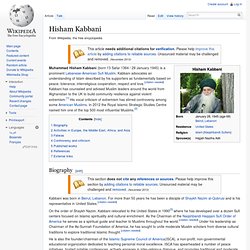
Kabbani advocates an understanding of Islam described by his supporters as fundamentally based on peace, tolerance, interreligious cooperation, respect and love. [citation needed] Kabbani has counseled and advised Muslim leaders around the world from Afghanistan to the UK to build community resilience against violent extremism.[1] His vocal criticism of extremism has stirred controversy among some American Muslims. In 2012 the Royal Islamic Strategic Studies Centre named him one of the top 500 most influential Muslims.[2]
Alévisme. Un article de Wikipédia, l'encyclopédie libre. « Alévi » redirige ici.
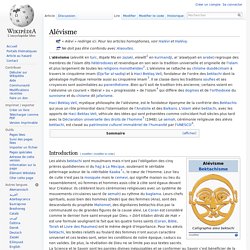
Pour les articles homophones, voir Halévi et Halévy. L'alévisme (alevilik en turc, Itiqate Ma en zazaki, elewîtî[1] en kurmandji, al ‘alawīyyah en arabe) regroupe des membres de l'islam dits hétérodoxes et revendique en son sein la tradition universelle et originelle de l'islam et plus largement de toutes les religions monothéistes[2]. L'alévisme se rattache au chiisme duodécimain à travers le cinquième imam (Dja'far al-sadiq) et à Haci Bektaş Veli, fondateur de l'ordre des bektachi dont la généalogie mythique remonte aussi au cinquième imam[3].
Il se classe dans les traditions soufies et ses croyances sont assimilables au panenthéisme. Haci Bektaş Veli, mystique philosophe de l'alévisme, est le fondateur éponyme de la confrérie des Bektachis qui joua un rôle primordial dans l'islamisation de l’Anatolie et des Balkans. Introduction[modifier | modifier le code] Représentation de Zulfikar, l'épée de Hz. Nuh Ha Mim Keller. Nuh Ha Mim Keller (born 1954) is an American Muslim convert to Islam.
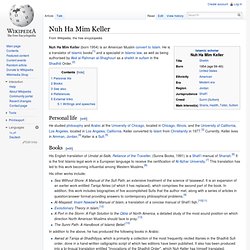
He is a translator of Islamic books[1] and a specialist in Islamic law, as well as being authorised by Abd al-Rahman al-Shaghouri as a sheikh in sufism in the Shadhili Order.[2] Personal life[edit] He studied philosophy and Arabic at the University of Chicago, located in Chicago, Illinois, and the University of California, Los Angeles, located in Los Angeles, California.
Tahir Allauddin. Tahir Allauddin Al-Gillani (السيد طاهر علاؤ الدين الجيلاني البغدادي) (June 18, 1932 - June 7, 1991) formally referred to as His Holiness, Qudwatul Awliya Naqeeb ul Ashraaf Hazoor Pir Syedna Tahir Allauddin alGillani alQadri alBaghdadi, was a Sufi Saint who lived in the twentieth century and was the head of the Qadiriyya Baghdadia Spiritual Tariqa.
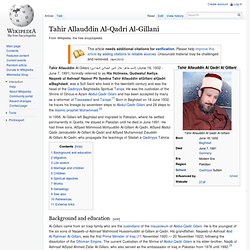
He was the custodian of the Shrine of Ghous-e-Azam Abdul-Qadir Gilani and has been accepted by many as a reformer of Tassawwuf and Tariqat.[1] Born in Baghdad on 18 June 1932, he traces his lineage by seventeen steps to Abdul-Qadir Gilani and 28 steps to the Islamic prophet Muhammad.[2] In 1956, Al-Gillani left Baghdad and migrated to Pakistan, where he settled permanently in Quetta. He stayed in Pakistan until he died in June 1991. Henry Corbin. Henry Corbin (14 April 1903 – 7 October 1978) was a philosopher, theologian and professor of Islamic Studies at the Sorbonne in Paris, France.
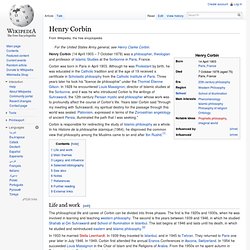
Corbin was born in Paris in April 1903. Although he was Protestant by birth, he was educated in the Catholic tradition and at the age of 19 received a certificate in Scholastic philosophy from the Catholic Institute of Paris. Three years later he took his "licence de philosophie" under the Thomist Étienne Gilson. René Guénon. René Guénon (November 15, 1886 – January 7, 1951), also known as Shaykh 'Abd al-Wahid Yahya, was a French author and intellectual who remains an influential figure in the domain of metaphysics, having written on topics ranging from metaphysics, "sacred science"[1] and traditional studies[2] to symbolism and initiation.
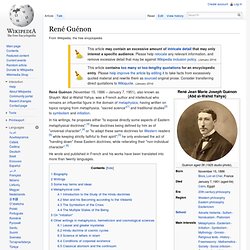
In his writings, he proposes either "to expose directly some aspects of Eastern metaphysical doctrines",[3] these doctrines being defined by him as of "universal character",[4] or "to adapt these same doctrines for Western readers [5] while keeping strictly faithful to their spirit";[3] he only endorsed the act of "handing down" these Eastern doctrines, while reiterating their "non-individual character".[6] Lex Hixon. Lex Hixon (1941–1995) (born Alexander Paul Hixon Junior, also known as Nur al-Anwar al-Jerrahi in the Sufi community) was an American Sufi author, poet, and spiritual teacher.
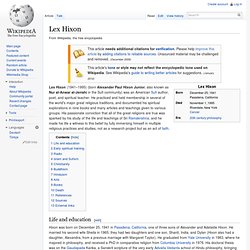
He practiced and held membership in several of the world's major great religious traditions, and documented his spiritual explorations in nine books and many articles and teachings given to various groups. His passionate conviction that all of the great religions are true was sparked by his study of the life and teachings of Sri Ramakrishna, and he made his life a witness to this belief by fully immersing himself in multiple religious practices and studies, not as a research project but as an act of faith.
Life and education[edit] Hixon was born on December 25, 1941 in Pasadena, California, one of three sons of Alexander and Adelaide Hixon. He married his second wife Sheila in 1965; they had two daughters and one son. Muzaffer Ozak. Works[edit] IrşadEnglish: Irshad – Wisdom of a Sufi MasterAşk Yolu Vuslat TarikiEnglish: The Unveiling of LoveSpanish: La Develación del AmorEnvar-ül-KulubEnglish: Lights of the HeartsZiynet-ül-KulubEnglish: Adornment of HeartsGülsar-i ArifanHazret-i Meryem (not published in Turkish) English: Blessed Virgin MaryGerman: Die gesegnete Jungfrau Maria im IslamSpanish: MariamSofiyye Sohbetleri (not published in Turkish) English: Garden of DervishesLove is the Wine (edited by Robert Frager) German: Der Wein der Sufis (zusammengestellt von Robert Frager) (Title of first edition: Liebe ist der Wein)Spanish: El Amor es el Vino (recompilado por R.
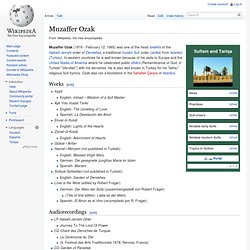
Frager) Audiorecordings[edit] LP Halveti-Jerrahi-DhikrJourney To The Lord Of PowerCD Chant des Derviches de TurquieLa Cérémonie du Zikr(5. Omar Ali-Shah. Omar Ali-Shah (Hindi: ओमर अली शाह, Urdu: عمر علی شاہ) was a prominent exponent of modern Naqshbandi Sufism who lived from 1922 to 2005.
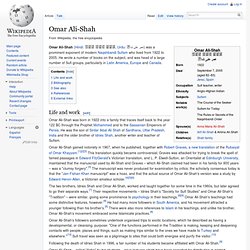
He wrote a number of books on the subject, and was head of a large number of Sufi groups, particularly in Latin America, Europe and Canada. Life and work[edit] Omar Ali-Shah was born in 1922 into a family that traces itself back to the year 122 BC through the Prophet Mohammed and to the Sassanian Emperors of Persia. Frithjof Schuon. Frithjof Schuon (/ˈʃuːɒn/; German: [ˈfʀiːtˌjoːf ˈʃuː.ɔn]; June 18, 1907 – May 5, 1998) was born to German parents in Basel, Switzerland.
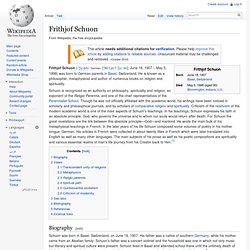
He is known as a philosopher, metaphysicist and author of numerous books on religion and spirituality. Schuon is recognized as an authority on philosophy, spirituality and religion, an exponent of the Religio Perennis, and one of the chief representatives of the Perennialist School. Though he was not officially affiliated with the academic world, his writings have been noticed in scholarly and philosophical journals, and by scholars of comparative religion and spirituality.
Criticism of the relativism of the modern academic world is one of the main aspects of Schuon's teachings. Idries Shah. Idries Shah (16 June 1924 – 23 November 1996) (Persian: ادریس شاه, Urdu: ادریس شاه, Hindi: इदरीस शाह), also known as Idris Shah, né Sayed Idries el-Hashimi (Arabic: سيد إدريس هاشمي) and by the pen name Arkon Daraul, was an author and teacher in the Sufi tradition who wrote over three dozen books on topics ranging from psychology and spirituality to travelogues and culture studies. Titus Burckhardt. Titus Burckhardt (Ibrahim Izz al-Din after his Islamic name), a German Swiss, was born in Florence, Italy in 1908 and died in Lausanne, Switzerland in 1984. He devoted all his life to the study and exposition of the different aspects of Wisdom and Tradition. He was an eminent member of the "traditionalist school" of twentieth-century authors. He was a frequent contributor to the journal Studies in Comparative Religion along with other prominent members of the school.
Yaqeen. Stages[edit] Ilm al-yaqîn (the knowledge of Certainty)[edit] The first degree is referred to by the name ‘ilm al-yaqîn (the knowledge of Certainty), which means that Certainty is the result of knowledge. At this degree the object of Certainty is knowledge just as the aim of knowledge is Certainty. William Chittick. William C. Chittick is a leading translator and interpreter of classical Islamic philosophical and mystical texts.
He is best known for his groundbreaking work on Rumi and Ibn 'Arabi, and has written extensively on the school of Ibn 'Arabi, Islamic philosophy, Shi'ism, and Islamic cosmology. Biography[edit] Born in Milford, Connecticut, Chittick finished his BA at the College of Wooster in Ohio, and then went on to complete a PhD in Persian literature at Tehran University under the supervision of Seyyed Hossein Nasr in 1974. He taught comparative religion at Tehran's Aryamehr Technical University and left Iran before the revolution. Frithjof Schuon. Un article de Wikipédia, l'encyclopédie libre. Ghulam Mustafa Khan. Ghulam Mustafa Khan, PhD, D.Litt, SI (September 23, 1912 – September 25, 2005) was a researcher, critic, linguist, author, scholar of Urdu literature and linguistics, educationist and religious and spiritual leader belonging to Naqshbandi order of Sufism.
Khwaja Shamsuddin Azeemi. Nazim al-Qubrusi. Shah Abdul Latif Bhittai. Khwaja Ghulam Farid. Ibn 'Ata Allah. Hadhra. Haḍra (Arabic: حضرة) is a collective supererogatory ritual performed by Sufi orders. It is often held on Thursday evenings after the night prayer, on Fridays after Jum`a prayer or on Sunday evenings, and can also celebrated on special Islamic festivals and at rites of passage. Muhammad Alawi al-Maliki. Kashf. Kashf (Arabic: كشف) "unveiling" is a Sufi concept rooted in Gnostic ideals dealing with knowledge of the heart rather than of the intellect. Kashf describes the state of experiencing a personal divine revelation after ascending through spiritual struggles, and uncovering the heart (a spiritual faculty) in order to allow divine truths to pour into it.
Kashf is etymologically related to mukashafa “disclosure”/ “divine irradiation of the essence”,[1] which connotes “gain[ing] familiarity with things unseen behind the veils”.[2] For those who have purified their hearts, and who come to know the Divine Names and Attributes to the fullest of their individual capacities, the veils in front of the purely spiritual realms are opened slightly, and they begin to gain familiarity with the unseen. In Sufism, an even further revelatory capacity exists by which the Divine mysteries become readily apparent to the seeker through the light of knowledge of God. This is called tajalli "manifestation".[3] Timothy Winter.
Timothy John Winter (born 1960), also known as Abdal Hakim Murad, is a British Sunni Muslim researcher, writer and academic. He is the Dean of the Cambridge Muslim College, Director of Studies (Theology and Religious Studies) at Wolfson College and the Shaykh Zayed Lecturer in Islamic Studies at Cambridge University.[2][3][4] His work includes publications on Islamic theology and Muslim-Christian relations.[5] In 2003 he was awarded the Pilkington Teaching Prize by Cambridge University and in 2007 he was awarded the King Abdullah I Prize for Islamic Thought for his short booklet Bombing Without Moonlight.[2][5] He has consistently been included in the "500 Most Influential Muslims" list published annually by the Royal Islamic Strategic Studies Centre and was ranked in 2012 as the 50th most influential.[6][7]
Qalander Ba Ba Auliya. Marifa. Ihsan. Shah Hussain. Ivan Aguéli. Tahir-ul-Qadri. Yunus Emre. Noor (Sufism) Chiisme.